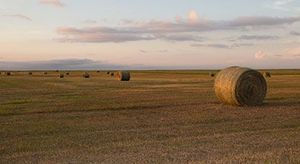Enrollment Deadline for Pasture, Rangeland and Forage Rainfall Index Insurance is December 1
 Pasture, Rangeland, Forage Rainfall Index Insurance (PRF-RI) offers Midwest livestock and forage producers a flexible option to insure against low rainfall. Unlike traditional crop insurance, producers choose the months they want to insure as a part of their coverage. This allows flexibility in insuring different types of forage production systems that may benefit from rainfall at different times of the year.
Pasture, Rangeland, Forage Rainfall Index Insurance (PRF-RI) offers Midwest livestock and forage producers a flexible option to insure against low rainfall. Unlike traditional crop insurance, producers choose the months they want to insure as a part of their coverage. This allows flexibility in insuring different types of forage production systems that may benefit from rainfall at different times of the year.
Premiums are determined by the USDA Risk Management Agency (RMA) with a goal of being actuarily sound. This should mean that, on average, the indemnities paid out from PRF-RI are approximately equal to the premiums collected. PRF-RI premiums vary depending on the per-acre value insured, two-month intervals selected, and coverage levels chosen, which each impact the size and likelihood of an indemnity payment.
Enrollment strategies significantly affect outcomes. A pure profit maximization strategy focuses on choosing the intervals with the months with high rainfall variability. This may result in higher average indemnities and net returns, but may increase the risk the producer receives no indemnity when they have a loss due to a lack of rainfall in months in which coverage doesn’t apply.
A second commonly used strategy is a risk management strategy, where the intervals are chosen to spread the percentage of value across intervals coinciding with the typical growing season in the Midwest: 33% in March/April 33% in May/June, and 34% in July/August. This strategy may provide more risk protection during low-yield years.
The best enrollment strategy for a given producer will depend on their preferences toward risk aversion, overall risk exposure from a lack of rainfall, types of forage systems, and many other factors.
Please contact your local ProAg crop insurance agent to work out the strategy that best fits your current farming and ranching operation. The enrollment deadline is December 1, 2024 and premium payments are due by September 1 of the following year.
